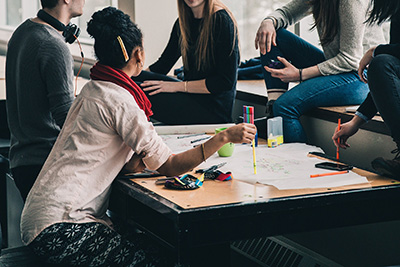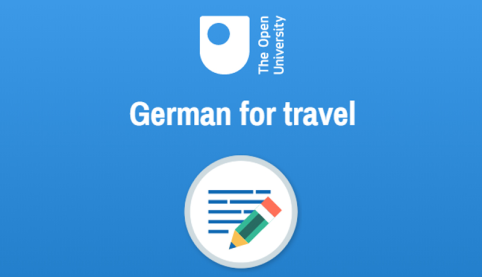Learning languages, with its emphasis on communication and practice, can seem daunting, especially outside traditional classrooms. In the academic year 2017/18 the award-winning ‘Flipping German’ project set out to explore how the flipped classroom methodology, that shifts the responsibility for learning strategies and, ultimately, the content of learning to the learner, can be applied to language modules at the Open University (OU).
Distance learning at the OU already has much in common with the ‘Flipped Classroom’ methodology. The learning resources provided, for example, include a variety of materials supporting independent learning strategies. Students receive materials, prepare independently, and then attend tutorials to discuss. The ‘Flipped Classrooms’ methodology parallels traditional distance learning in this sense. It aims to convert the classroom into a space for discussion and practice.

Based on socio-constructive learning theory, the ‘Flipped Classroom’ concept assumes that effective learning requires learners to construct their own understanding of subject matter. Learning, it claims, is most effective when it is constructed through social interaction with other students and teachers. More explicitly than in ‘traditional’ distance teaching, the learner is addressed not as a passive recipient, but as an active constructor.

To apply the ‘Flipped Classroom’ concept into the distance learning module Rundblick: beginners’ German, we thus had to extend the concept and emphasise the aspects of content selection and responsibility for learning. The project was carried out in two rounds, consisting of three consecutive steps each. Firstly, students were asked to select aspects of German they want to learn in more depth from a list. Thus they were given the responsibility to choose their own learning content and identify topics particularly relevant for themselves. Secondly, the Associate Lecturers designed materials according to the three most popular choices and posted these on the student forum. Thirdly, the project team offered live synchronous online sessions. A key factor in these sessions was the flipping of traditional teacher/learner roles: students explained both their learning strategies and the content of their learning to each other, whereas the role of the project team was reduced to moderating. Thus the focus lay not only on the teaching and learning of content: vocabulary, grammar, or speaking, but also on reflecting on learning strategies, sharing ideas and advice with fellow students.
Feedback such as..
“Makes you think about how things work if you have to explain to others”
or..
“There's always something useful in hearing from others - little hints and tips”
..showed how much our students profited from taking responsibility for their learning, reflecting, and sharing their learning strategies. Specifically for language learning, the benefits of an active approach cannot be overestimated: with the option of choosing relevant topics, students take on the responsibility to mould their language exactly to their own needs, often choosing speaking over writing, fluency over accuracy, and comprehension over production. As teachers, we were impressed by how capable our language students were to take on the role of peer teacher as well as active learner.
Implementing ‘Flipped’ principles into our distance language learning module has confirmed to us that distance education already presumes an active form of learning. We can capitalise on this by extending what is already a “flipped” approach to give even more responsibility to those students capable of taking charge of their own and their peer’s learning while never neglecting those who benefit from careful materials preparation and selective scaffolding.




Rate and Review
Rate this article
Review this article
Log into OpenLearn to leave reviews and join in the conversation.
Article reviews